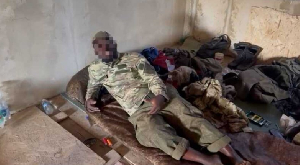Chartered Economist, Emmanuel Amoah Darkwa, has suggested the laxity in the law that regulates the banking sector has increased ponzi schemes in the country.
In an interview with Kwame Tutu on Rainbow Radio 87.5FM, Mr Darkwa said, because the regulator, Bank of Ghana (BoG), has enforced sanctions where necessary, people have taken advantage and defrauding people.
The Deposit Protection Act passed in 2016 he noted was initiated to protect depositors from unforeseen circumstances that may result in loss of funds.
He said, due to the laxity, some financial institutions without licenses take advantage, take customers deposits and later deprive them of it.
These unlicensed depositors taking companies, promise customers lucrative and unrealistic returns but fail to pay when the time is due.
"What they do is to rob Peter to pay Paul,’’ he added.
Ghanaians he said are generally ‘greedy’ when it comes to the issue of money and are unable to do due diligence before investing their monies.
Using himself as an example, he said, I once invested my money at Safeway Tilapia Investment, which is now defunct.
The investment company he decried promised customers huge returns, returns that were unrealistic.
Customers he said were promised more than 80 percent of their principal amounts.
In 2016, the company halted operations. It was established that the company was indebted to customers to the tune of GHc27 million.
Sharing his experience he said, greed and the lack of proper investigation into some of these ponzi schemes make p[people lose their hard earned cash to these unlicensed companies.
Mr Emmanuel Amoah-Darkwa advised Ghanaians to compare the normal treasury rates to the returns promised by some of these investment companies before investing their monies.
He called for a broad stakeholder consultation and more powers for the Central Bank in order for them to clamp down on unlicensed companies operating as deposit taking institutions.
The issues in the financial sector are becoming national security issues and I encourage the national security to intervene, he added.
In 2017, the Bank of Ghana (BoG) served notice that it will begin the implementation of the Ghana Depository Protection Act, 2016 (Act 931) in the second quarter of the year.
The Act, which was passed by Parliament in 2016, was introduced to protect depositors from unforeseen circumstances that may result in loss of funds.
According to the law, depositors whose monies get locked up in financial institutions during crisis may receive up to GH¢6,250 in compensation. The Deposit Protection Fund Corporation will pay this.
Business News of Saturday, 3 November 2018
Source: rainbowradioonline.com
Ponzi schemes increasing in Ghana because of greed & laxity in our laws - Economist
News

I don’t know if I’ll survive another day - Ghanaian man 'forced' into Russia’s war in Ukraine says
Sports














